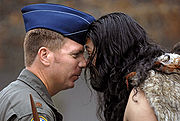
Powhiri
Encyclopedia

Maori culture
Māori culture is the culture of the Māori of New Zealand, an Eastern Polynesian people, and forms a distinctive part of New Zealand culture. Within the Māori community, and to a lesser extent throughout New Zealand as a whole, the word Māoritanga is often used as an approximate synonym for Māori...
welcoming ceremony
Ceremony
A ceremony is an event of ritual significance, performed on a special occasion. The word may be of Etruscan origin.-Ceremonial occasions:A ceremony may mark a rite of passage in a human life, marking the significance of, for example:* birth...
involving speeches, dancing, singing and finally the hongi
Hongi
A hongi is a traditional Māori greeting in New Zealand. It is done by pressing one's nose and forehead to another person at an encounter....
. It is used to both welcome guests onto a marae
Marae
A marae malae , malae , is a communal or sacred place which serves religious and social purposes in Polynesian societies...
or during other ceremonies, such as during a dedication of a building (where the the owners or future users of the building might be welcomed). A pōwhiri may not be performed for every group of manuhiri (visitors); a mihi whakatau ("informal greeting to visitors") may be used instead. Pōwhiri is often used for special visitors or for tūpāpaku (the body of the deceased) for a tangihanga
Tangihanga
Tangihanga, or more commonly, Tangi, is a Māori funeral rite.Each iwi differs on how they honour those who pass. Tangihanga generally take three days with burial on the third day. From the moment of death, the tūpāpaku is rarely alone. The tūpāpaku is transported to the marae...
(funeral). However, pōwhiri are also often performed for tourist groups as part of special events.
For most non-Māori speakers, the Wero, an aggressive challenge of the visitor at the beginning of the ceremony, is the most spectacular part of the pōwhiri. During this part of the ceremony, three Māori warriors will advance cautiously towards the guests with ceremonial weapons, and perform threatening gestures and grimaces, calling out battle screams, and generally giving an impression of being ready to explode into violence against the visitors at any moment. The first warrior represents the realm of Tumatauenga, the Atua (God) of War. The third Warrior represents Rongo the Atua of Peace (Rangimarie). It is the final warrior who offers the rautapu, a signal that the manuhiri (guests) may enter the Marae-atea. Historically, this has roots in both showing off the martial prowess of the iwi
Iwi
In New Zealand society, iwi form the largest everyday social units in Māori culture. The word iwi means "'peoples' or 'nations'. In "the work of European writers which treat iwi and hapū as parts of a hierarchical structure", it has been used to mean "tribe" , or confederation of tribes,...
's warriors, as well as testing the steadfastness of the visitors.By accepting the rautapu, a leaf or carved effigy, that the lead warrior will place on the ground before the visitors as a symbolic offering of peace, this part of the ceremony is concluded.
On some occasions the pōwhiri begins before the karanga
Karanga (Maori culture)
A karanga is an element of cultural protocol of the New Zealand Māori people. It is an exchange of calls that forms part of the powhiri, a Māori welcoming ceremony. It takes place as a visiting group moves onto the marae or into the formal meeting area...
(the call), at other times it begins after the karanga has started. At some point the karanga and the pōwhiri will be taking place at the same time. For the pōwhiri, the kaikaranga (female caller) usually stands to the side and slightly to the front of the remainder of the tangata whenua
Tangata Whenua
Tāngata whenua is a Māori term of the indigenous peoples of New Zealand and literally means "people of the land", from tāngata, 'people' and whenua land.-Meanings:...
(hosts). Those who take part in the pōwhiri include elders and young people (men/women). After the manuhiri (guests) and tangata whenua are seated, both sides will have speakers usually beginning with the tangata whenua. The ceremonial tapu
Tapu
Tapu, tabu or kapu is a Polynesian traditional concept denoting something holy or sacred, with "spiritual restriction" or "implied prohibition"; it involves rules and prohibitions...
(sacred) is lifted when tangata whenua and manuhiri make physical contact (hariru, hongi).

